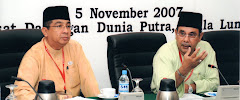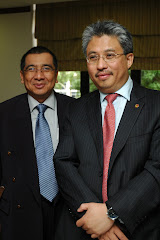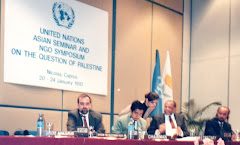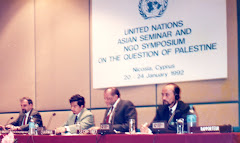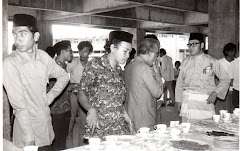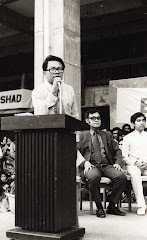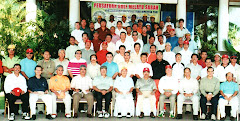TV3 interviewed me tonight. Here are some key points I wanted to make:
ON THE PASSING OF TAN SRI JAMALUDDIN JARJIS AND DATO’ AZLIN ALIAS
I had the privilege of working with both of these fine public servants and I can tell you that their contribution to the government, to UMNO, and to our country was immeasurable.
They were committed to a strong and prosperous Malaysia, a regional powerhouse that serves as an example for other countries. Whilst we have made significant progress towards this, there is still work to be done.
Within their loss, I am more determined than ever to lead our country towards realising this goal. That is what they would have wanted.
CRITICISM FROM TUN MAHATHIR
I respect Tun Mahathir as I respect every other citizen of this country. It is the rakyat’s right to ask questions of me, to question my performance as Prime Minister, and the performance of the Government I lead.
However, at the end of the day, we are a democracy. I was elected by my party, and by the people of this country, to lead them. As such, I am answerable only to the people – not to any one individual. And if at the next general election, the people want change, they will let us know through the ballot box.
GST
I understand that there is some concern around the introduction of the GST. However, for the long term good of the economy, it is important that we broaden our tax base.
As Prime Minister, it is my responsibility to make the right decisions for all Malaysians, even if it can seem difficult at the time. I believe the introduction of the GST is an important reform that will help us build a stronger, more sustainable and transparent economy.
I have been made aware that some unscrupulous businesses, both big and small, are trying to take advantage of the introduction of GST to increase prices above the 6% rate. This is completely unacceptable.
I have instructed the relevant ministry to step up their enforcement efforts to ensure that any increases introduced by shopkeepers and business owners are in line with the 6% GST rate, and that any abuses of this system which negatively harm the consumer are brought to a halt.
STATE OF ECONOMY
Despite criticism from certain quarters, which damages investor confidence and harms our economy, our economy continues to develop fast and our economic fundamentals remain strong.
However, no country is isolated from global events, and we have already had a taste of the challenges with the falling oil price affecting everything from the ringgit to rubber.
Our economy’s growth and success did not come out of thin air. It came because we made the right decisions for Malaysia. I have always maintained that in politics you have to make the right decisions, not just the easy and populist ones.
1MDB
At the start of the year, 1MDB came under new leadership, and a strategic review of the business was carried out.
Following its completion, a decision was made to restructure the business, and this process is currently underway.
However, it is important to remember that 1MDB’s assets are greater than its liabilities. So, in very simplistic terms, if 1MDB were to be wound down tomorrow, the company would still have some assets and money left even after paying off all its debt.
At the same time, I recognise that there are a number of questions swirling around 1MDB. Some of these questions are valid, but there are others that appear to be directed at the company solely with the intention of creating controversy.
That is precisely why I have instructed the Auditor General to undertake a comprehensive audit of the company and independently verify its accounts. This report will then be passed on to the Public Accounts Committee, which as you know is a fully bipartisan body for scrutiny.
This should ensure that the process is open and transparent, and all questions that have been asked of the company should be sufficiently and independently answered. Now, we must let the process run its due course.
However, there are certain elements who continue to repeat the same old allegations about 1MDB, more often than not without full knowledge of 1MDB’s affairs.
The people behind these attacks know that they have the potential to damage investor confidence in the country, which in turn would have a negative impact on the economy, but continue to do this. That is irresponsible and putting politics before the national interest.
NEXT GENERAL ELECTION
The result of the next general election will be decided by the people.
What we know is that, as long as BN and UMNO remain united, we will win the election. And that is certainly the case as leaders from Sarawak and Sabah, from the Peninsula, from many different parties in BN have made clear in recent days.
The only way we would lose the election is if there is internal sabotage and bickering, but I am confident that the party would not tolerate any acts of betrayal within it, and will stay united.
SEDITION ACT
You have to bear in mind that circumstances change. From time to time, we need to re-evaluate things, and leaders can change their mind when it comes to doing what is best for the rakyat.
In order to realize our goal of building a stable, peaceful and harmonious state, the Sedition Act has been maintained.
The Sedition Act is not just for Muslims; it is for the protection of all Malaysians. It is aimed at preventing any person who promotes feelings of hostility between persons or groups on the grounds of religion - whether the religion attacked is Christianity, Hinduism, Islam or any of the other faiths Malaysia is proud to be home to.
We will not and cannot stand for the incitement of racial or inter-ethnic conflict. We have come too far to harm the progress that we have made. And that is why the government decided to keep the Sedition Act and amend it to make it a better and more suitable law.
NEW ANTI-TERROR LAWS
I have no greater priority than the safety and security of Malaysians. I take the threat of terrorism very seriously. The new anti-terror laws will help us address the threat that radical and extreme ideologies pose to Malaysia and how we are to stop it.
Contrary to what some are suggesting, these laws will not be used against critics of the government; rather, they will be an extra tool for dealing with the militant threat that all countries face.
We will do whatever necessary to prevent this sort of extremist ideology, which opposes Islamic teachings, democratic practices and humanitarian values.































